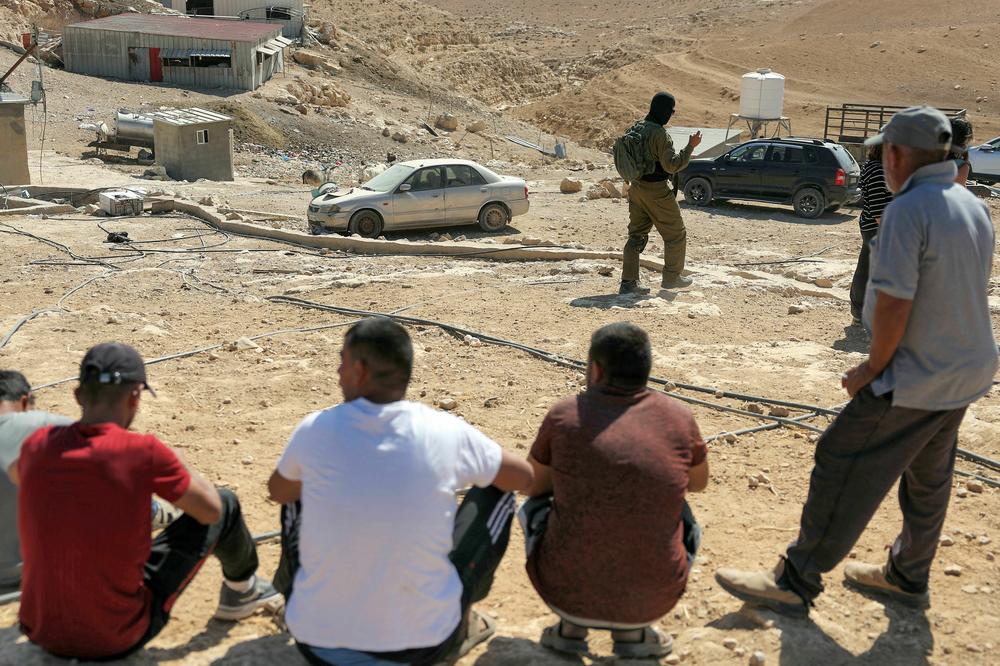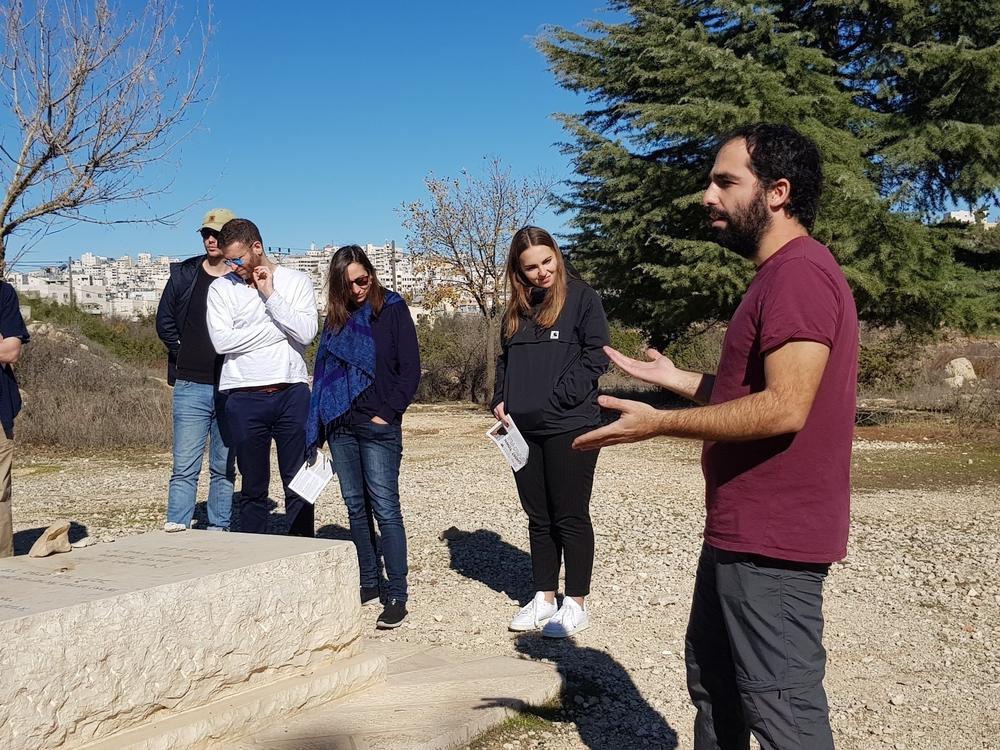Section Branding
Header Content
A former Israeli soldier calls for international intervention to stop settler violence
Primary Content
Updated November 16, 2023 at 7:58 AM ET
It wasn't long after Ori Givati became a combat soldier in the Israeli army in 2010 that he began to question his mission.
He spent much of his time not acting on specific security threats in the Israeli-occupied West Bank, but making sure "all of the Palestinians feel like they cannot lift their heads up," he told Morning Edition's Leila Fadel.
Givati, 32, is now advocacy director for Breaking the Silence, a group made up of Israeli military veterans who are against their country's occupation of Palestinian territories. They collect testimony from former soldiers to educate the public on how the occupation is enforced.
While much of the world's attention including Givati's is on Gaza, where Israel has been waging a punishing response to the Oct. 7 attack on several Israeli communities, he is also alarmed by what's happening in the other Palestinian territory where he once served — the West Bank.
Settler violence aimed at Palestinians has surged and reached record levels there in the weeks since the war between Israel and Hamas broke out, according to the United Nations and several rights groups. Scores of Palestinians have been killed in the West Bank and more than a dozen Palestinian communities have fled in fear of attack in the last month alone, which is almost twice as many as last year. Yesh Din, an Israeli human rights group, says 90% of attacks are closed without an indictment being filed.
Givati says none of this is surprising.
Below are some highlights from NPR's interview with former Israeli soldier Ori Givati. Answers have been edited and condensed for clarity and length.
On how he views the Oct. 7 attack by Hamas on Israel
I'm talking to you now probably in the most devastating time in my life as an Israeli, as an activist, as a person, human being seeing the atrocities of Oct. 7. You know, some of my family members were texting me from their basements that there are terrorists in their home. Luckily they survived, but that was the kind of text I received on Oct. 7. But at the end of the day, I think this is precisely what we have to remember when we talk about the concept of managing the conflict. The concept that we will maintain millions of people under our military occupation indefinitely—it failed.
We have been saying it failed because we know how it works as soldiers who were sent to maintain it, to extend it, to entrench it. It failed before Oct. 7, but now more than ever, we know it failed. That means we have to change course. Because at the end of the day it doesn't matter how many Palestinians we will kill in this war in Gaza, there will be Palestinians in Gaza. It doesn't matter how many Palestinians we kill or arrest or settlers expel from their homes in the West Bank, there will be Palestinians in the West Bank. So, the only viable future here is to change course, we don't want to see more bloodshed. Of course Israel has the right to defend itself after the atrocities of Hamas. It's not a contradiction.
We have to do what we need to protect our citizens, but we have to make sure that what we are doing has a political goal, a political end.
On the relationship between settlers and the Israeli military
I joined to be a combat soldier because I wanted to protect my country, my friends and my family. When I see the military that I joined used as an employee of the settler movement, this process is terrifying for me. It's already devastating for the security of Israel itself.
You don't have the order to stop violent settlers. What you do have orders for is to protect the Jewish community. We don't have orders as soldiers to protect everyone in the area. We have hundreds of testifiers. None of them said that they received an order to detain a settler attacking a Palestinian, even though it's the most simple order.
On how Israeli soldiers show Palestinians "who's the boss"
Occupying millions of people for decades means you control their everyday life. The first command I received as a soldier in the West Bank was to make all of the Palestinians feel like they cannot lift their heads up. We have to make sure that they know who's the boss. How do we do that? We make sure that all of the Palestinians cannot pass a day without understanding who is controlling them.
For example, one of the missions is called a mock arrest. A mock arrest is when a group of soldiers invades a Palestinian home in the middle of the night, arrests one of the family members. It can be a few minutes, sometimes it's a few hours. They choose, with intelligence, the home of a family that is not violent; they arrest the father, usually, and then bring them back because they're just training for a future mission. Imagine the impact of this mission to the kids, to the wife, to the family.
On settler violence against Palestinians in the Israeli-occupied West Bank
The violence is not new. It didn't start during this war. It started in 1967 from the first day of the occupation. But today, what we're seeing in the West Bank is the peak of this violence. To understand the violence we have to understand what's behind it. Violent settlers understand that by attacking a Palestinian community in a rural village, if they do it with enough persistence and with enough interruption they can make them move away.
Violent people exist everywhere, criminals exist everywhere. But what we are seeing today is a phenomenon of settlers attacking Palestinians while the military, which is supposed to protect the Palestinians, is actually protecting the attackers. Palestinians in these communities are left with zero protection of their families, of their lands, of their culture, and are basically left with no options, leaving sometimes decades-old communities.
On why he finds the surge in settler violence "terrifying" for Israel
How can we get even a step closer to a peaceful future when we give the violent settlers weapons and when they are in the government? (Givati is referring to the Minister of Police, Itamar Ben-Gvir, who has been convicted of crimes like incitement to racism, destroying property and supporting an Israeli terrorist organization)
In order for us to get any better from this situation, we have to do the opposite. We have to arrest violent settlers, not give them weapons. And we are not doing this. And that's why it's so scary for me, because it's becoming harder to understand the future we're moving towards.
On the Israeli government and the international community's responsibility
Throughout the years, we heard all of our leaders — and I'm not talking only about Netanyahu; I'm talking about the people who are considered more moderate — saying condemnations about settler violence and how there are rotten apples and how we must stop them, all while doing nothing about it. Nothing.
Now, Biden's statement [in which he said attacks by "extremist settlers" amounted to "pouring gasoline"] on the Middle East is very important. But to prevent forcible transfer, which is happening every day in the West Bank, we need more than words. We are now in a place where, without direct intervention from the international community, the forcible transfer of Palestinians will go on and on. We're now seeing settlers exploiting the fact that eyes are on Gaza.
Intervention can be anywhere from limiting the weapons to the settlers, to differentiation of settlements and labeling products, all the way to sending international forces to the West Bank. All of these options are there. The international community knows what to do, and they have to start using the many tools they have on their table right now.
Check out npr.org/mideastupdates for more coverage, differing views and analysis of this conflict. Get the latest updates from NPR's reporters in the morning by subscribing to the Up First newsletter.
Copyright 2023 NPR. To see more, visit https://www.npr.org.



